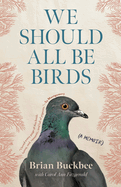
Brian Buckbee, in collaboration with Carol Ann Fitzgerald, has written a memoir of extraordinary grace and beauty about hope and resilience in the face of debilitating illness with We Should All Be Birds.
An avid traveler, Buckbee found his world caving in on itself after he was stricken with a mysterious illness during a trip to Southeast Asia. Reeling from a breakup with his fiancée, L., a woman he still loved, Buckbee became increasingly isolated, tortured by relentless migraines, and frustrated by a lack of treatment for or diagnosis of his symptoms.
After a chance encounter with an injured pigeon he named Two-Step, Buckbee rehabilitated the bird, and soon his home turned into a feathered chaos of wounded and recovering birds. Although Two-Step thrived, found a mate, and began his return to the wild, Buckbee's condition deteriorated physically and emotionally. Nonetheless, by rescuing Two-Step, Buckbee began to save himself.
Buckbee's prose (brilliantly edited by Fitzgerald, to whom he dictated the memoir) is vibrant, lyrical, and pulsing with life and the wonder of nature. His ruminations drift from descriptions of majestic Asian fruit bats to soft-focus memories of L. and her son, the loss of one of his avian wards to a hawk, the cruelty of his pain, and the sweetness of his makeshift bird sanctuary. The sense of loss and loneliness is intense but so, too, is the sense of compassion Buckbee shows for his rescued birds and the companionship he receives from them. We Should All Be Birds is both elegy and paean, a celebration of life and the discovery of hope within pain. --Debra Ginsberg, author and freelance editor

